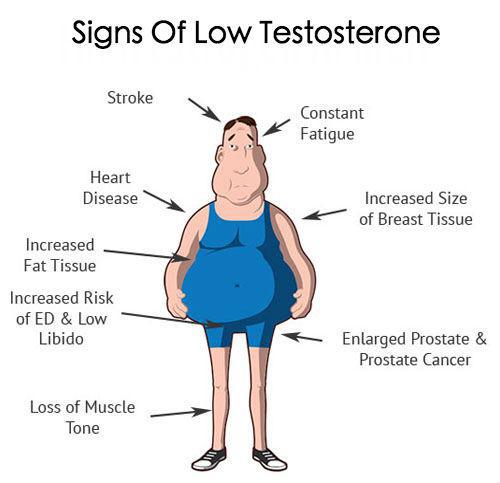The "Low T" Epidemic: Common but Not Normal
I’d be surprised to come across someone who hadn’t heard the term “low T”. There are “low T” centers popping up all over the country and you hear advertisements targeted toward men about boosting their “T” on TV, radio, and billboards. I’m talking about the epidemic of low testosterone that seems to be sweeping the nation. Men everywhere are experiencing fatigue, depression, weight gain, loss of strength, and decreased sexual drive and function. Advertisements would make one think that it is normal for an aging man to experience these symptoms due to diminishing testosterone levels and that corrective treatment is the only option. However, it may be very common these days—and being seen at younger and younger ages—but it is not normal, and there many different approaches to this issue.
Conventional medical treatment for low testosterone is hormone replacement therapy, which could be anything from pills, patches, creams, or injections. Physicians are even utilizing “pellet therapy” where testosterone pellets are being implanted under the skin. All these methods are attempting to replace a hormone that the body is struggling to make itself. Using these synthetic hormones may alleviate symptoms in some but they do not fix the underlying problem. Rather, they create imbalances in the body, and can lead to unwanted side effects. To understand this epidemic and how best to approach treatment we have to look at what may be causing low testosterone. There are three driving factors that can drastically affect testosterone levels.
The first aspect we need to look at is whether or not we are giving our body enough raw materials to make testosterone and other sex hormones. Sex hormones are made from cholesterol and if we do not eat enough dietary cholesterol our body simply cannot make sex hormones. Further, if we eat low quality or damaged cholesterol (like we get from animal products that are not from grass fed, or pastured animals) we are going to get not-so-functional testosterone. If you have read my other blog posts you know that I advocate a high fat, high cholesterol diet made up of high quality grass fed animal products, thus giving your body the materials it needs to make sex hormones, among many other benefits.
Secondly, just giving your body enough healthy cholesterol to make sex hormones may not be enough in some cases. There is another factor that can affect sex hormone production--stress. Most of the body’s testosterone is produced in the testes, but a fair amount is made in the adrenal glands. The adrenal glands do many other things as well, one of them being that they secrete the stress hormone cortisol, which requires cholesterol. When cholesterol is available, our adrenal glands can convert it to a molecule called pregnenolone. Pregnenolone is then taken and made into either cortisol or dehydroepiandrosterone, or DHEA. DHEA is the precursor to our sex hormones. Our adrenal glands respond to demand. Therefore, if we become chronically stressed, a majority of our pregnenolone will get converted into cortisol and very little will get converted into sex hormones. For some reason, testosterone production seems to be dramatically affected by this phenomenon which is called “The Pregnenolone Steal.” Chronic stress can have a major affect on hormone production, but it isn’t even the main player in our low testosterones epidemic.
A Functional Medicine Approach to Lasting Vitality
The third and final factor driving low testosterone is actually overexposure to estrogen, more specifically, what are known as “xenoestrogens,” or toxic estrogens. Xenoestrogens have been shown to cause decreased libido, weight gain, and male breast tissue. The most common sources of these xenoestrogens are plastics, sunscreens, chemicals, and foods such as flaxseeds, and soybeans. If you think you don’t get exposed to any of these things, think again. Plastics have infiltrated our lives including our food supply. In addition to the sunscreen you put on your body, just swimming in the ocean or a pool will expose you to all the washed off sunscreen others are wearing, and soy is one of the most common ingredients in processed foods. With our high exposure to these xenoestrogens we have to wonder whether many men with symptoms of low testosterone actually have low testosterone or if they have high xenoestrogen exposure. If you are someone who has tried testosterone replacement therapy and not had the best results, then low testosterone may not be your issue.
So what can we do about these factors that are driving our “low T” epidemic? Eating high quality grass fed animal products is a good place to start. As is improving your stress management skills, avoiding and/or detoxifying xenoestrogens, so you can restore your natural balance of testosterone with other hormones. In our functional medicine program at Balance Wellspace, we can help you with this approach by guiding you nutritionally, helping you detoxify your body and reduce stress through modalities such as, Stress Relief Therapy, Far-Infrared Sauna, and Frequency Specific Microcurrent. Preventing hormone imbalances and getting to the root cause of a hormone imbalance is one of the most important things we can do as we age for lasting vitality and wellness.
Stay healthy out there!
Dr. Stephen Hussey is a board certified Chiropractor and Functional Medicine practitioner who lives in Roanoke, VA. He is director of Functional Medicine at Balance Wellspace where he specializes in managing chronic conditions such as Diabetes, Thyroid Disorders, Autoimmune Diseases, Heart Disease, Weight Loss, Fibromyalgia, Chronic Fatigue Syndrome, Asthma, High Blood Pressure, Allergies, Liver Disease, Migraines, and many more.

